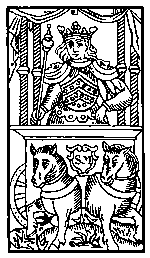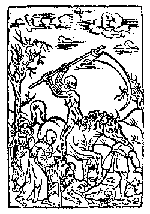| Tarot and a Medieval Fantasy |
| featuring The Assembly of Gods by John Lydgate |
| Tarot and a Medieval Fantasy |
| featuring The Assembly of Gods by John Lydgate |
Twenty-two years ago I had a privilege of reading Lydgate's The Assembly of Gods (1412) under the tutorship of a remarkable professor, Japanese authority
of Goddess Fortune study. It's a typical of medieval fantasy, beginning
with a narrator/observer meditating beside a lake and fell asleep. In his
dream he met Morpheus who took him to the assembly of Roman gods held at
the palace of Apollo. Descriptions of gods with their appearances and attributes
followed in the astrological order. But the joyful banquet got disturbed
when Discord enterd and found no seat for her. Out of wrath she went out
of the palace and happened to meet Attropos, to whom the goddess told the
story. Attropos (in this tale a male deity with death attribute) sympathized
the goddess and went into the palace to make a turmoil.
Attropos took the office of death bringer by the warrant of the gods. He
did not spare anyone high and low, from Hector, Alexsander the Great, David
the King, Nebuchadnezzar to Hannibal and Scipio. All have fallen under
his feet except one. The gods had promised that no one is able to escape
from Attropos's deadly dart, but the one is. Attropos accused the gods
of injustice.
All the gods at the banquet promised Attropos to destroy the man and asked
their enemy's name. "It is Virtue" replied Attropos. At this
name Pluto reacted with zeal and sent for his illegitimate son Vice to
battle with Virtue. And Vice and his vicious army entered...
The descriptions of vicious army are of some interests.
Vice rode on a winged serpant breathing fire.
And his Seven Captains are --
Pride riding on a lion
Envy on a wolf
Wrath on a wild boar
Covetousness on a elephant
Gluttony on a bear
Lechery on a goat
Sloth on an ass
Among the minor vices we find "Closshers, carders, with comon hasardoures"
(line 696). Judging from the line 695 "Cursyd apostates, relygyous
dyssymulers" and the line 697 "Tyburne coloppys and pursekytters",
the moralistic position of card-gambling at that time is obvious.
Morpheus secretly went out of the palace to tell Virtue about the pre-war
situation. Virtue hurridly assembled his army with the help of Imagination
and to the field they marched.
The descripitions of Virtue and his hosts is worth quoting.
|
"But to enforme you howe he thedyr came, And what maner capyteyns he to the felde brought - Hymsylfe, sekerly, was the furst man Of all hys gret hoost that thedyrward sought, Syttyng in a chare that rychely was wrought, With golde & peerles & gemmes precious, Crownyd with laurer as lord vyctoryous" |
|
"Four dowty knyghtys about the chare went At every corner on hit for go gyde, And convey accordyng to Vertew hys entent. At the furst corner was Ryghtwysnes tha tyde, Prudence at the second was set to abyde. At the thyrd Streyngth, the fourth kept Temperance. These the chare gydyd to Vertue hys plesaunce." |
 |
Virtue's Seven Captains are --
Humility with a crest of falcon, riding on a lamb
Charity with a pelican on a tiger
Patience with a phoenix on a camel
Liberality with an osprey on a dromesdary
Abstinence with a parrot on a hart
Chastity with a turtle dove on a unicorn
Good Business with a crane on a panther.
It is interesting to note that seeral minor captains Imagination had gathered
were refused by Virtue.
| "These folowyd Konnyng & thedyr with hym came, With many oon moo offryng her seruyce, To Vertew at that nede; but natwithstandyng than Som he refusyd and seyde in nowyse They shuld with hym go, and, as I coude auyse, These were her names: fyrst, Nygromansy, Geomansy, Magyk, and Glotony Adryomancy, Ornomancy, with Pyromansy, Fysenamy also and Pawmestry, And all her sequelys, yef I shuld nat ly. |
These divinations joined the vicious army.
Then Vice dubbed fourteen knights ; Falsehood, Dyssymulacion, Symony, Vsure,
Wrong, Rebawdy, Malyce, Deceyte, Ly, Extorcion, Periury, Diffidence, Apostasy,
and Boldness in Yll.
Virtue dubbed fourteen knights as well : Feythe, Hope, Mercy, Trouthe,
Ryght, Resystence of Wrong, Confession, Contricion, Satisfaccion, Verry
Drede of God, Performyng of Penaunce, Perfeccyon, Konnyng, and Good Dysposicion.
(These procedures seem to reflect the opening of chess game).
The war of Vices and Virtues began in a field called Microcosm. In the midst is the Conscience, the judge of the combat.
After the fierce battle Virtue won : Vice was carried away from the field
to meet Despair and Hell.
With the result Attropos dismissed the Roman gods and turned to Lord of
Light. He proposed to serve the Lord and changed his name to Death.
 |
All the vision vanished then, and Morpheus took the narrator/observer to
an arbor with four walls. It is a sort of school and there sat Dame Doctrine,
her appearance being familiar to us.
| Crowned she was lyke an Emperesse, With iii crownes standyng on her hede on hy, All thyng about hyr an infynyte processe, Were to declare, I tell yow certeynly. |
The walls of arbor were covered with the scenes from the Old Testament
and New Testament. Dame Doctrine interprets the visions the narrator/observer
saw. Long explanations followed, and the narrator found himself awake in
his bed; all was a dream.
Now, the Tarot. As seen above, the medieval fantasies have lots in common
with the tarot symbolism, especially of Bologna and Minchiate. We can see
the Sequence trump I-V as the Roman Gods, VII Chariot as Virtue with four
cardinal knights around him. The position of Wheel of Fortune in the middle
of trump series, and vicious circle around the devil is easily explained
by the structures of army. Many things concerning Tarot can be found in
this fantasy alone, and there are lots of similar tales in the medieval
era.
That the pagan death-bringer Attropos becomes Death under the Christian
jurisdiction reminds one of the fear and desperation the Black Death brought
to Europe, and somehow I feel the human strength in the descriptions of
minor vices.
Here are the whole texts of The Assembly of Gods
BACK